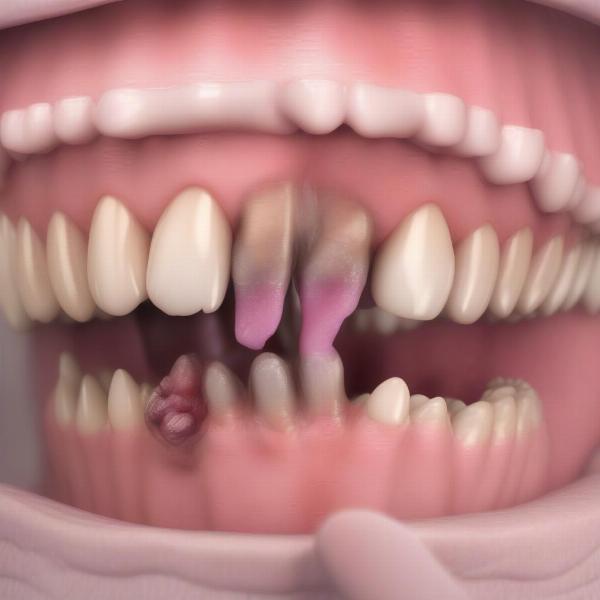Oral tumors in dogs can be a frightening discovery for any pet owner. Understanding what these growths might look like and knowing when to seek veterinary attention is crucial. This article will provide you with information about the different types of oral tumors in dogs, accompanied by descriptions of what they might look like, helping you to better understand this complex issue. [keyword]: pictures of oral tumors in dogs.
Recognizing Oral Tumors in Your Dog
Oral tumors can present in a variety of ways, from small, barely noticeable bumps to large, ulcerated masses. They can affect the gums, tongue, lips, palate, and other areas inside the mouth. Some tumors may appear as raised, cauliflower-like growths, while others might be flat and discolored. Bleeding, bad breath, difficulty eating, and excessive drooling are all potential signs of an oral tumor. Early detection is essential for the best possible outcome.
 Oral Tumor on Dog Gums
Oral Tumor on Dog Gums
It’s important to remember that not all lumps and bumps in a dog’s mouth are cancerous. However, any new growth or change in the mouth should be examined by a veterinarian.
Types of Oral Tumors in Dogs
Several different types of tumors can develop in a dog’s mouth. Some are benign, meaning they are not cancerous and unlikely to spread, while others are malignant and can spread to other parts of the body. Common types of oral tumors in dogs include melanomas, squamous cell carcinomas, fibrosarcomas, and epulides.
Melanoma
Melanomas are tumors that arise from pigment-producing cells. They can occur in various parts of the body, including the mouth. In the oral cavity, they are often darkly pigmented but can sometimes be pink or unpigmented. They are frequently aggressive and can spread quickly.
Squamous Cell Carcinoma
Squamous cell carcinoma is the most common type of oral tumor in dogs. These tumors often appear as ulcerated, raised masses on the gums, tonsils, or tongue. They can cause significant discomfort and difficulty eating.
Fibrosarcoma
Fibrosarcomas are malignant tumors that arise from connective tissue. They can be locally invasive and may recur even after surgical removal. In the mouth, they often appear as firm, fleshy masses.
What to Do if You Suspect an Oral Tumor
If you notice any unusual growths, lumps, or discoloration in your dog’s mouth, schedule a veterinary appointment immediately. The veterinarian will perform a thorough examination and may recommend further diagnostic tests such as a biopsy to determine the nature of the growth. Early diagnosis and treatment are crucial for improving a dog’s prognosis, especially with malignant tumors.
Conclusion
Oral tumors in dogs can be a serious concern. By familiarizing yourself with the potential appearances of these tumors and seeking prompt veterinary care when necessary, you can play a vital role in protecting your dog’s health. Remember that early detection is key to successful treatment and management. [keyword]: pictures of oral tumors in dogs.
FAQ
- Are all oral tumors in dogs cancerous? No, some oral tumors are benign and do not spread. However, only a veterinarian can determine if a growth is cancerous.
- What are the signs of an oral tumor in a dog? Signs may include bad breath, bleeding from the mouth, difficulty eating, excessive drooling, and visible lumps or growths.
- How are oral tumors in dogs diagnosed? Diagnosis typically involves a physical examination and a biopsy of the suspicious tissue.
- What is the treatment for oral tumors in dogs? Treatment options vary depending on the type and stage of the tumor and may include surgery, radiation therapy, and chemotherapy.
- Can oral tumors in dogs be prevented? There is no guaranteed way to prevent oral tumors, but regular veterinary checkups and good oral hygiene can help with early detection.
- What is the prognosis for a dog with an oral tumor? The prognosis depends on various factors, including the type of tumor, its stage, and the dog’s overall health.
- Where can I find more information about oral tumors in dogs? Consult with your veterinarian or visit reputable veterinary websites like the Veterinary Cancer Society.
ILM Dog is a leading international online resource dedicated to providing expert advice on dog care and wellbeing. We offer a wealth of information on dog breeds, health, training, nutrition, grooming, and much more. Whether you’re a seasoned dog owner or just starting your journey, ILM Dog is your trusted companion for all things canine. From understanding specific breeds to managing complex health issues, we are committed to providing you with the most accurate and up-to-date information. Contact us at [email protected] or +44 20-3965-8624 for personalized guidance. Let ILM Dog be your guide in providing the best possible care for your furry friend.